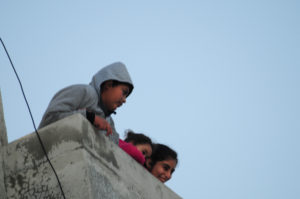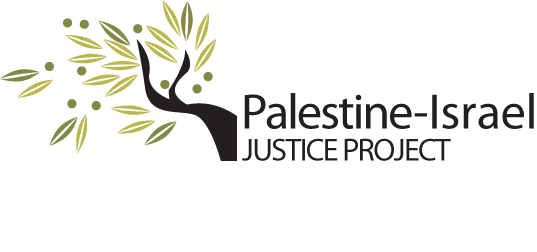Palestine/Israel: Introduction to the Study

Purpose:
- To introduce participants to the Kairos Palestine Document, an appeal by Palestinian Christian leaders to the world community and specifically theologians.
- To use this document as an overview of the issues and the foundation for this Palestine-Israel study.
Materials:
- Make available copies of the Kairos Palestine Document and post a copy of it on your computer and show with a projector, if possible.
It is also found in the Reference Material section after the Sessions. - Use the World Council of Churches link. (click here)
- List of religious leaders and questions for Parts 1 through 4. These can be projected from computer.
- Copy of Psalm 77:1 on chart paper-posted on the wall.
Method:
- Read Psalm 77:1-3, 11-15
- In this introductory session, specific sections of the Kairos Palestine Document, which was released December 2009, will be read and discussed by the group. Kairos is a Greek word meaning a right or opportune time. In Christianity it has been adapted to mean “God’s time.” It is now our time as members of the United Methodist Church to play a pivotal role in bringing justice and peace to Palestine and Israel.
Participants will understand that this document, in many ways, will introduce them to the Palestine-Israel conflict and the various sessions of this curriculum. Throughout the various sessions, it is suggested that participants return to this document and note how the document speaks to the conflict and how we as Christians should respond to the Palestinian and Israeli call for justice and peace.
(The following activities can be done as a whole group or in smaller groups.)
Introduction and List of Religious Leaders (names follow these questions)
- Who is issuing this call? Who do these individuals represent? Why is this an important document?
- Part 1, “The Reality on the Ground” – What are some examples of the Palestinian reality? Any information that is new to you?
- Part 2, “A Word of Faith” – How does section 2.2 begin to broaden our understanding of who the descendants of the Holy Land are?
- In Section 2.2.2, what is the point being made about the “living Word” and the “dead letter”?
- What does section 2.3.1 say is the universal mission of the land which is the home of Palestinians?
- Part 3, “Hope”
- Read Section 3.1 and note the words of Paul and how important these words are to Palestinian Christians.
- What are some “signs of hope” for Palestinians? Why might some of these “signs” make you feel hopeful about a just resolution to the Palestinian-Israeli conflict?
- In Section 3.4, “The Mission of the Church,” how do the injustices experienced by Palestinian Christians compel us to seriously reflect on Luke 17:21, “The Kingdom of God is among you.”
- Part 4 – “Love”
- Reviewing section 4.2, what do we learn is the relationship between “love” and “resistance”?
The remainder of this important document speaks to us the Christian brothers and sisters of Palestinians, to the churches of the world, to the international community, to Jewish and Muslim leaders, and to the Palestinian people and Israelis. In our last session, we’ll discuss these sections. In the meantime, you are asked to set aside time at home to read the message of the Palestinian Christian leadership.
The Palestinian Religious leaders who wrote this document:
His Beatitude Michel Sabbah
Latin Patriarch of Jerusalem (1987-2008). International President of Pax Christi. Grand Prior of the chivalric Equestrian Order of the Holy Sepulchre of Jerusalem.
His Grace Bishop Dr. Munib Younan
Evangelical Lutheran Church Bishop of Palestine and Jordan. President of the International Christian Committee (ICC) in Jerusalem.
His Eminence Archbishop Atallah Hanna
Archbishop of Greek Orthodox Church of Jerusalem.
Rev. Dr. Jamal Khader
Catholic priest. Dean of the faculty of Letters at the Catholic University of Bethlehem.
Rev. Dr. Rafiq Khoury
Palestianian theologian. Vicar of the Patriarchate of Jerusalem.
Rev. Dr. Mitri Raheb
Pastor of the Evangelical Lutheran Church in Jordan and the Holy Land. President of the Diyar Consortium (Bethlehem ).
Rev. Dr. Naim Ateek
Episcopal pastor. Founder and head of the Sabeel Ecumenical Liberation Theology Center in Jerusalem
Rev. Dr. Yohana Katanacho
Rev. Fadi Diab
Pastor of the Episcopal Church in Zabadeh.
Geries S. Khoury
Director of the Al-Liqa Center for Religious and Heritage Studies in the Holy land (Jerusalem). Dean of the Theological Department at Mar Elias Educational Institutions.
Cedar Duaybis
Founding member of the Sabeel Ecumenical Liberation Thology Center (Jerusalem)
Nora Kort
Head of Office for International Orthodox Christian Charities’s operations in Jerusalem and the West Bank.
Lucy Thaljieh
Nidal Abu El Zuluf
Yusef Daher
Executive Secretary of Jerusalem Inter-Church Centre
Rifat Kassis
President of Defence for Children International Executive Director of the East Jerusalem YMCA Director of the Ecumenical Accompaniment Programme in Palestine and Israel (World Council of Churches).
*Close with a prayer for Social Justice such as found in the hymnal or your own prayer.
<< Reference Materials | Session 1 (current) | Session 2 >>
